
Area students graduated from South Dakota State University following the fall semester.
Among the graduates are Trevor Larson, Hamill, summa cum laude; Michael Hofeldt, Winner; Baili Jo McCance, Dallas and Brittney Ann Piper, Wood.

Area students graduated from South Dakota State University following the fall semester.
Among the graduates are Trevor Larson, Hamill, summa cum laude; Michael Hofeldt, Winner; Baili Jo McCance, Dallas and Brittney Ann Piper, Wood.
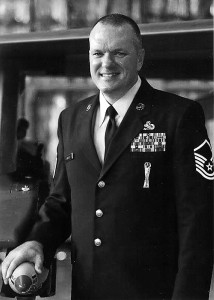
MSgt John A. Spear retired from the United States Air Force after serving his country for 21 years. He served tours in England, Japan, and Korea and was deployed on 4 separate occasions to the Middle East. John, his wife Lyn and stepdaughter Nicole will relocate to the Phoenix, AZ area. John is the son/step son to Roger and Diane Studt.
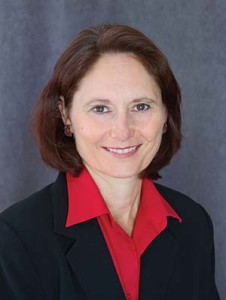
Lisa (Pistulka) Minardi, Fair Oaks, Calif., formerly of Winner, has been named agent of the year for Modern Woodmen of America. She was announced the agent of the year for the Mina Mostoufi region of northern California.
Minardi is the daughter of Betty Sattler and the late Bill Pistulka.
Minardi is ranked as a top tier advisor with MWA finishing as the number 10 producer in the United States for 2016.
She has obtained presidents cabinet which is the highest tier in MWA. She has established herself as an ethical and educated advisor. Not only has seen been successful as a representative within ModernWoodmen, but in the industry at large. She has earned membership status with million dollar round table placing her among the top producers. The advisor earning million dollar round table joins advisors from around the world.
Her past achievements reveal an earning of the MWA national conference 14 consecutive years. She has placed number one not only in career schools I and II but ranked as the number one producer in the financial advisors forum as well.
She focuses on estate planning during the accumulation and distribution phase of retirement. She protects and advises in the specific areas of IRA, 401ks and non qualified accounts in addition to asset protection with life insurance.
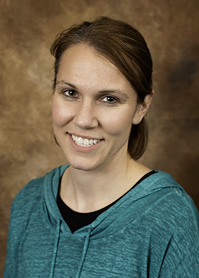
Karla Brozik, executive director of the Winner Area Chamber of Commerce, asked the Tripp County Commissioners last Tuesday if they would partner with the Chamber to provide hospitality/customer service training.
The commissioners voted to partner with the Chamber and agreed to provide $500.
Brozik said a speaker has been chosen but the exact date of the customer service training has not been set.
Brozik invited the commissioners to the annual meeting of the South Central Development Corporation which was held on March 20 at the Legion.

Four Winner kids wrestled at Black Hills Nationals on March 17 in Spearfish.
Maxton Brozik won first place in novice at 70 pounds, Kaden Keiser won first place in school boy at 100 pounds, Owen Duffy won third place in schoolboy at 150 pounds and Kaleb Osborn won 4th place in schoolboy at 80 pounds.

University of Sioux Falls baseball player Austin Richey of Winner is seeing key playing time for the Cougars at the designated hitter early in the season.
Richey has appeared in seven of the Cougars nine games in the season including five starts at DH. The redshirt senior from Winner also plays first base.
Richey had a two hit game Feb. 26 against Metro State Denver including an 11th inning RBI triple to help USF to a 7-4 win. For the season at this point, Richey is hitting .286 with four RBIs and six walks and two stolen bases.
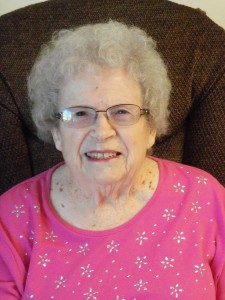
Violet Mae (Fischer) Kaiser, 89, of Winner, SD passed away Sunday, March 12, 2017 at the Winner Regional Long Term Care Center.
Funeral service were held on Friday, March 17, 2017 at 10:30 a.m. at the Trinity Lutheran Church in Winner, SD. Burial followed in the Winner City Cemetery. A visitation was held on Thursday, March 16, 2017 from 6-7 p.m. at the Trinity Lutheran Church with a prayer service beginning at 7 p.m.
Violet was baptized July 31, 1927 and was confirmed August 24, 1941 both at St. Paul’s Lutheran Church, McNeely, SD.
Violet attended all 8 years of grade school at New Lake country school and 4 years of high school in Colome. She lived all 4 years in the Colome dorm. After graduation in 1945 she was accepted into Springfield Teachers College where she attended 1 ½ years of college. After graduating with a teaching degree, she taught 3 years in country schools until dad needed her help on the farm.
Violet was the oldest of four children so therefore she helped her dad in the field plowing, disking and mowing hay. She said that she never helped him plant because it was too hard to watch if the planter would plug up.
Violet had met the love of her life at the church they both attended. One Sunday when her mom and dad were unable to go to church Violet went alone. After church Ruben came over to the car and asked her to go to the movies that next Saturday. After that movie date she told her mom that I’m going to marry that red headed Kaiser boy someday. Her mom said to her you think you are and her reply was “I know I am”. After that the rest was history. They were married on April 6, 1947 at Zion Lutheran Church of Colome. To this union three daughters were born: Cheryl in 1948, Janet in 1949 and Garnet in 1952.
After they were married they lived on Ruben’s dad’s farm near Millboro where they lived for 10 years. They always liked to neighbor with many relatives and friends who lived nearby. Times were very hard. Mom said that the blizzard of 1952 and the dirty 30’s were there hardest years.
In 1957 they bought the William Dohmen place 3 miles north of Colome where they farmed and raised livestock. For several years they traveled to Arizona and Texas for part of the winter.
When Ruben’s health began to fail they sold their farm and moved to Winner in 1991. Mom dearly enjoyed gardening and flowers.
In January 2012 she moved to the Golden Prairie Manor where she dearly loved to play cards twice a day and bingo twice a week. She was placed in the Winner Regional Long Term Care Center on March 6, 2017 where she resided to the time of her death.
Violet was a member of the Trinity Lutheran Church where she sang in the choir for many years. She served as president of the Trinity Lutheran Ladies Aide and was also a member of the Sully Homemakers Extension Club for several years. She was also a member of the Area Retired Teachers Association and the Winner VFW Ladies Auxiliary.
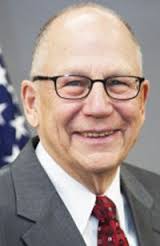
Under federal statute, the United States Attorney for the District of South Dakota, Randolph J. Seiler, will remain in his current appointed position until the President nominates and the U.S. Senate confirms his successor. Seiler has not been asked to tender his resignation.
Seiler assumed the duties of Acting U.S. Attorney for the District of South Dakota on March 12, 2015, when former U.S. Attorney Brendan Johnson resigned. In October of that same year, Seiler received the official nomination by President Barack Obama to be the 41st U.S. Attorney for the District of South Dakota. Pursuant to an order signed by then U.S. Attorney General Loretta Lynch on October 6, 2015, Seiler was sworn in that same day by U.S. District Judge Roberto A. Lange, at a ceremony at the U.S. District Courthouse in Pierre, South Dakota.
Seiler’s nomination was sent to the U.S. Senate for confirmation, but it was not acted upon in the allotted timeframe. Given that, federal statute 28 USC 546 – subsection (d) provides the U.S. District Court the authority to appoint a U. S. Attorney. Subsequently, Chief Judge Jeffrey L. Viken, U.S. District Court,ordered Randolph J. Seiler as the U.S. Attorney for the District of South Dakota, effective February 5, 2016. Statutorily, Seiler can remain in his position until it is filled by the new administration. Seiler has been with the U.S. Attorney’s Office for over 20 years. From November 2009 to March 2015, Seiler served as both the First Assistant U.S. Attorney and the Tribal Liaison for the District of South Dakota. Prior to serving in those two capacities, Seiler was an Assistant U.S. Attorney, and he spent 14 years prosecuting violent crime offenses in Indian country and other areas throughout the state. Seiler also served as counsel to the Director in the Executive Office for U.S. Attorneys at the Department of Justice in Washington, D.C., in 2008. He has been an instructor at the National Advocacy Center in Columbia, South Carolina, as well as a presenter at numerous conferences and trainings on various topics including violent crime, sexual assault, domestic violence, and legal issues in the prosecution of crimes in Indian country.
He has received the Attorney General’s Award for Fraud Prevention, as well as the Director’s Award for Superior Performance in Indian Country.

Attorney General Marty Jackley and Gregory County States Attorney Amy Bartling announced that Donald Kevin Story, 52, Dallas, was sentenced March 13 by Sixth Circuit Court Judge Brown to 25 years in the State Penitentiary.
“This is tragic reminder of how meth is driving violent crime in our communities,” said Jackley. “Combining the meth distribution with sexual crimes to a minor, and its impact to a young victim justified such a significant sentence.”
Story was sentenced to 10 years on one count of distribution of a controlled substance to a minor, methamphetamine and 15 years on one count of sexual contact with a child under the age of 16, with both counts to be served consecutively for a total of 25 years.
Story was indicted in May 2016 on various counts of distributing methamphetamine to minors and sexual contact with minors. He pled guilty to counts 1 and 2 in January 2017. The various crimes were alleged to have occurred in Gregory County at the defendant’s residence in Dallas between Feb. 1, 2016 and May 2016.

By David Bordewyk
Running an Italian restaurant plus a small bed and breakfast keeps owner Yucimy on her feet from sunrise to well past sunset. It’s 7 a.m. and she is already preparing omelets for her five B&B guests. Her cheerful greeting helps everyone shake off a night’s sleep.
Meanwhile, Yucimy’s employees are busy moving tables and chairs to the sidewalk outside the restaurant, which fronts the town’s main avenue, and are inviting passerbys to stop in for breakfast.
Late afternoon will have Yucimy and staff, some of whom are family, busy pouring drinks and planning dinner menus for the B&B guests. At night’s end, Yucimy can be found with her feet up in the small living room just off the restaurant’s kitchen, catching a few minutes of TV.
All in a day’s work for this privately owned business. Welcome to Vinales, Cuba.
In Havana, Rosana Vargas welcomes visitors to her jewelry store, where she shares her small business story. She started making fine silver jewelry five years ago in her small apartment. Today she has more than 40 people employed in her stylish, privately owned shop along a busy capital city street.
How much does she pay in taxes to the government for her small business success, she is asked.
“Too much,” Rosana says, sounding ever like a well-seasoned capitalist.
Except this isn’t Wall Street or Main Street. This is Cuba.
Along with 28 other Americans from the Midwest, I traveled to Cuba for seven days last week on a “people to people” tour, a kind of educational/tourism tour of the island nation that has the approval of both countries. An employee of a tourism company run by the Cuban government was our guide.
The trip gave a view of a country with compelling contrasts and day-to-day economic struggles for many Cubans that dropped our jaws. It also introduced us to some wonderful, inspiring Cuban people.
To be sure, Cuba remains very much a country ruled by leaders who belong to the Communist Party. Repression of speech, assembly and the press remain very much in play in Cuba today. The government pulls and pushes the levers that control much of Cuba’s way of life. It’s been that way since soon after Fidel Castro overthrew the Batista regime in 1959.
Yet, doors are opening. Capitalism, entrepreneurship and self-reliance are no longer negatives in Cuba. They are happening today in Havana and other parts of the country.
It will be difficult for the government to put the brakes on this growing capitalistic wave. President Raul Castro or the next leader may decide to encourage even more of this kind of growth. Who knows?
This is a country where the average official salary of a state government worker is the equivalent of about $25 per month. By the way, most Cubans work for the government or government-owned enterprises.
Teachers, lawyers and other professionals can make more money tending bar or waiting tables in a restaurant than they can in the jobs they were trained and educated to do.
There is a saying in Cuba that “if you pretend to pay me, I will pretend to work.”
Pretending to work for pretend pay is nothing new in Cuba. That’s been going on for many years.
What’s new is the rapidly burgeoning capitalism.
When the Soviet Union collapsed in 1991, the Cuban economy went into a free fall. Within a few years, the Cubans realized that growing tourism was necessary to help stave off collapse.
Tourism in Cuba has indeed accelerated the past 20 years. Canadians, Germans, British, Chinese, among others, travel to Cuba. They come for the rum, cigars, salsa music and the sun. The number of foreign tourists coming to Cuba has risen from about 750,000 in 1995 to 3.5 million two years ago.
And now the Americans are coming. The warming of relations between the two countries put in motion by the Obama administration means more and more American tourists are wanting to go to Cuba. We bumped into fellow Americans most everywhere we went during our week-long trip.
Cubans on the street we met cheer what Obama did. They express anxiety about President Trump.
Which takes us back to the small town of Vinales, in the heart of Cuba’s tobacco-growing region. The town has been a tourist destination for many years with bed-and-breakfasts throughout. Today, you see construction in much of the town. Residents are adding a room or two where they can to their small homes to accommodate the growing tourist tide.
Will growth in tourism pull Cuba out of its many economic problems? Probably not. Economic stability likely will take much more, given the scope of challenges.
A personal observation that overrides the nuts and bolts of Cuba’s wobbly GDP is this: My travel experience was that Cubans are genuine, friendly and welcoming. They smile wide and extend a hand when you tell them where you are from. They are willing to chat, even if language is a barrier. (Although almost no one seemed to know where South Dakota was located in America. The closest point of reference that rang a bell with Cubans was the Minnesota Twins. Cubans love baseball.)
More than once I heard Cubans on the street tell me they are eager for the day when the embargo imposed on their country by the United States will end. They believe such a move would make lives better for average Cubans.
In the meantime, they keep building B&Bs (casa particulares), opening privately owned restaurants (paladares) and welcoming more American tourists.
David Bordewyk is executive director of the South Dakota Newspaper Association, Brookings. He participated in a people to people tour of Cuba along with journalists and others from the Midwest March 5-12.
-30-